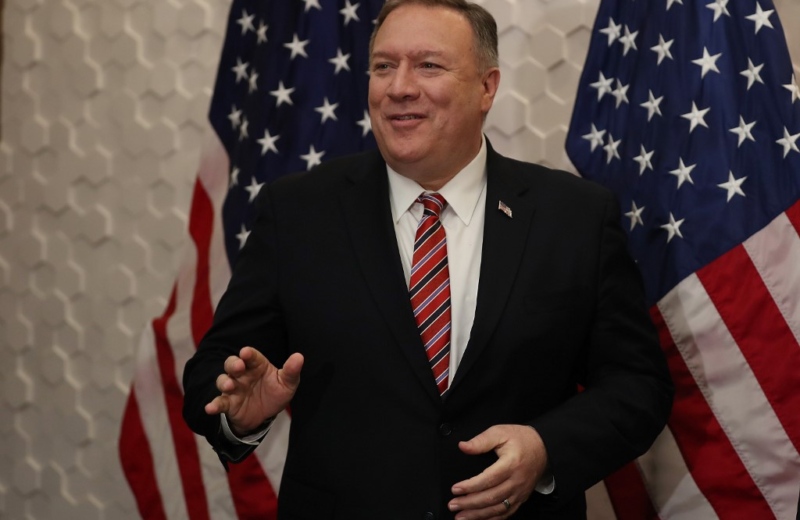Only days before his scheduled visit to Ukraine, U.S. Secretary of State Mike Pompeo asked National Public Radio reporter Mary Louise Kelly “Do you think Americans care about Ukraine?”
According to Kelly, “He used the F-word in that sentence and many others. He asked if I could find Ukraine on a map. I said yes, and he called out for aides to bring us a map of the world with no writing. I pointed to Ukraine. He put the map away. He said, ‘people will hear about this.'”
The exchange reportedly took place after an interview in which Kelly repeatedly pressed him on why he didn’t defend ex-U.S. Ambassador to Ukraine Marie L. Yovanovitch, who was removed from her assignment in Kyiv in late April by U.S. President Donald J. Trump. Her firing came after a smear campaign orchestrated by Trump’s personal lawyer, Rudy Giuliani. An investigation by the U.S. State Department is under way into whether Yovanovitch was also under surveillance days before she was told to leave her post in Kyiv.
According to NPR, “immediately after the questions on Ukraine, the interview concluded. Pompeo stood, leaned in and silently glared at Kelly for several seconds before leaving the room. A few moments later, an aide asked Kelly to follow her into Pompeo’s private living room at the State Department without a recorder. The aide did not say the ensuing exchange would be off the record. Inside the room, Pompeo shouted his displeasure at being questioned about Ukraine. He used repeated expletives, according to Kelly, and asked, “Do you think Americans care about Ukraine?”
The transcript of the interview can be read here.
Pompeo issued a statement on Jan. 25 calling Kelly a liar.
“NPR reporter Mary Louise Kelly lied to me, twice. First, last month, in setting up our interview and, then again yesterday, in agreeing to have our post-interview conversation off the record. It is shameful that this reporter chose to violate the basic rules of journalism and decency. This is another example of how unhinged the media has become in its quest to hurt President Trump and this Administration. It is no wonder that the American people distrust many in the media when they so consistently demonstrate their agenda and their absence of integrity. It is worth noting that Bangladesh is NOT Ukraine.”
The exchange came as Pompeo’s office on Jan. 24 announced that the secretary of state will be in Kyiv on Jan. 30. Pompeo canceled an earlier scheduled trip to Kyiv on Jan. 3 because of the situation in Iran. The same day, the U.S. killed Iranian general Qassim Soleimani in a drone strike.
Pompeo’s visit to Ukraine is part of a five-nation tour that starts in the United Kingdom and also includes stops in Belarus, Kazakhstan, and Uzbekistan.
According to a statement by State Department spokesman Morgan Ortagus, Pompeo will meet with UK Prime Minister Boris Johnson and UK Foreign Secretary Dominic Raab “to reaffirm the special relationship following the UK’s departure from the European Union and discuss ways to broaden and deepen trade ties.”
The secretary will then travel to Kyiv on Jan. 30, where he will meet with President Volodymyr Zelensky, Foreign Minister Vadym Prystaiko, and Defense Minister Andrew Zahorodnyuk “to highlight U.S. support for Ukraine’s sovereignty and territorial integrity.” The secretary will also attend a wreath-laying ceremony at St. Michael’s Cathedral “to honor those who have fallen in the Donbas, and meet with religious, civil society, and business community leaders.”
On Feb. 1, in Minsk, the secretary will meet with President Alexander Lukashenko and others to “affirm our desire to normalize our bilateral relations.” In Kazakhstan, Pompeo will “reaffirm our shared commitment to peace, prosperity, and security in Central Asia.” The secretary will then travel to Uzbekistan on Feb. 2-3, “to underscore U.S. support for Uzbekistan’s reforms and the country’s sovereignty, independence, and territorial integrity.” In Tashkent, the secretary will also “stress U.S. support for a better connected, more prosperous, and more secure Central Asia, consistent with the U.S.’s new Central Asia strategy.”



